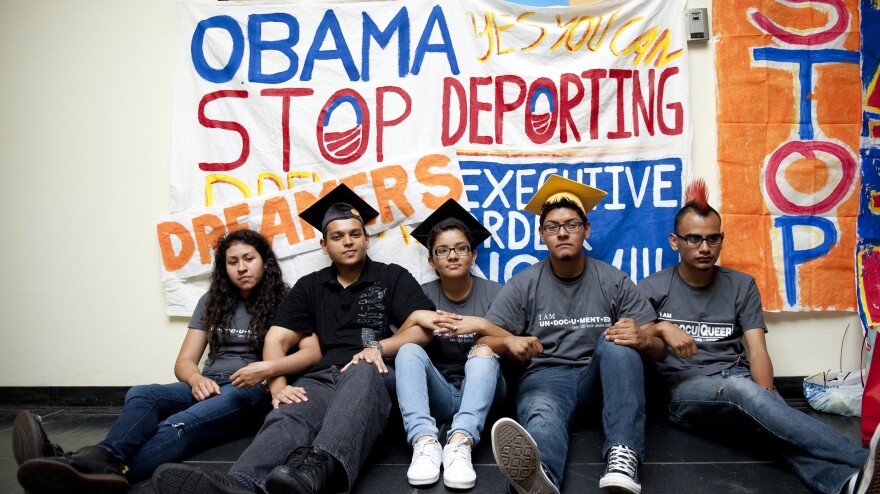At the University of California, Los Angeles, Labor Center in downtown L.A., more than 100 student leaders from around the country hugged and cheered as President Obama delivered his immigration announcement Friday.
Obama outlined a new policy to temporarily stop deporting some young illegal immigrants and make them eligible for work permits.
Diego Sanchez was born in Argentina and brought to Miami 12 years ago. He's working on getting his MBA. He welcomed the president's announcement.
"It's a big step, a big relief for our communities, especially as students," Sanchez says. "I'm not going to be thinking about what can happen if I get pulled over any more. Now you know that you can put your degree into work."
Students like Sanchez have been working for years to get Congress to pass the DREAM Act, to grant conditional residency to young people like them — brought to the U.S. as children. With the DREAM Act stalled, an increasing number of so-called "Dreamers" have gone public with their legal dilemma.
Cyndi Bendezu was born in Lima, Peru, and grew up in East L.A. She came here when she was 4 and has been undocumented for 23 years. She graduated from UCLA and is working on her master's degree at Columbia University.
"I know that we worked so hard for this, and I know Obama could do so much more," she says. "But I know this is an election year, and I know that he needs our votes. So I know what this is about: It's politics."
It's the politics — and timing — of Obama's announcement that has anti-immigrant groups riled up. Roy Beck, who heads the organization NumbersUSA, says Obama usurped power.
"[Congress] said no three times, and he goes, 'OK, I'll just do it on my own.' And he has stirred up a lot of new energy. Now he's made himself a huge target," Beck says.
The president's announcement also sparked much debate on the airwaves around the country. California Assemblyman Tim Donnelly, a Republican, spoke out against the policy on NPR member station KPCC.
"I think this just is a cynical ploy to try to pander to illegals in order to somehow get votes," he said. "The problem is he's doing this at the expense of our kids who are out there looking for work right now."
Some of the students who could benefit from Obama's order remain skeptical about how it will be enforced. Mexican-born high school student Jahel Campos was among a half-dozen others staging a weeklong sit-in outside Obama's campaign headquarters in Culver City. She says the president's order doesn't go far enough.
"We want the executive order which is going to stop all of the deportations. I'm more worried about my parents. I'm not worried about myself," Campos says.
But for students like Bendezu, who hopes to earn her Ph.D. in political science, Obama's words brought validation, at least for now.
"We are the future of this country, and they need us. And our parents taught us that. And our parents have struggled and they've sacrificed everything," she says. "It's finally time for them to realize we're human and we have feelings. Because it's so inhumane how they treat us like we don't exist. And we do."
Copyright 2021 NPR. To see more, visit https://www.npr.org.




